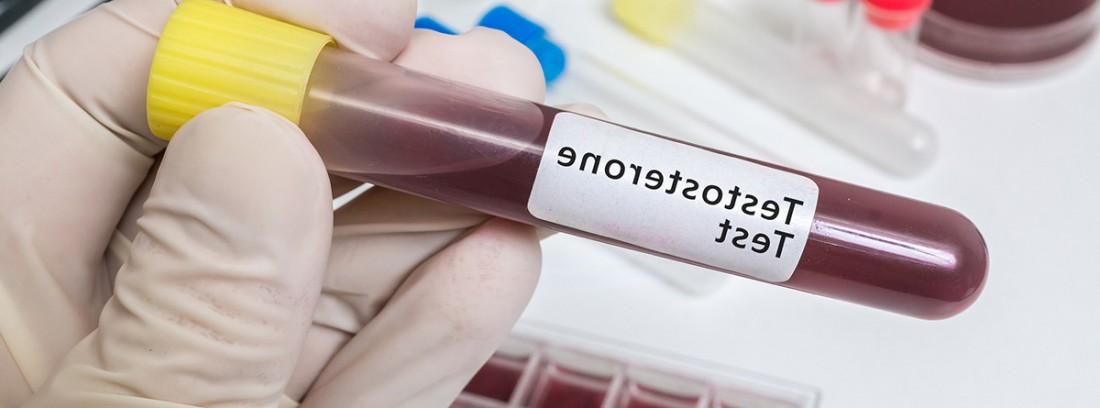What is testosterone and why is it low?

Testosterone is a sex hormone found in mammals, reptiles, birds, and other vertebrates. Its maximum production resides at the level of (95%) although the ovaries of the females and the adrenal glands are also producers, small glands that are above the kidneys. Their levels change throughout the day and we will find their maximum peak between 7-8 in the morning.
Testosterone function
- Stimulates the maturation of the sexual organs:
- In the fetus: formation of the penis, scrotum and prostate.
- At puberty: deepening of the voice, growth of beard and underarm, pubic and body hair. Hypogonadism is the disease caused by insufficient sex hormones and is one of the causes of infertility.
- Increases muscle and bone mass, which prevents osteoporosis.
- It is necessary for the normal development of the.
- It influences the functioning of platelets, thus intervening at the level of coagulation.
Testosteronehas the same protective effect in men as estrogen in women. Therefore, if it is below normal, it increases the risk of cardiovascular disorders and osteoporosis.
Low testosterone symptoms
When symptoms such as:
- Fatigue,
- Fatigue,
- Drowsiness…
- Decrease in normal red blood cells.
- Mood change with increased sadness, nervousness and irritability,
- Lower tolerance to exercise,
- Loss of muscle mass and strength,
- Decrease in hair and the frequency of shaving,
- Increase in,
- Decrease dsexual performance (blow libido, erectile dysfunction ... -this is the main reason for consulting the andrologist-),
- Decreased concentration and memory
Causes
As it is a hormone, its levels are variable and can vary according to some situations. Your levels may drop due to:
- The act of falling in love. It lowers the level of testosterone in men and raises it in women.
- The paternity. According to studies, the decrease in testosterone promotes changes in the behavior that favors parental care.
- The aging, the levels being reduced by 1% from the age of 30. At 50 years of age, testosterone is reduced by 12%, at 60 by 19%, at 70 by 28%, at 80 by 49% ... The testosterone deficit due to aging is not usually treated with pharmacological supplements.
- Some foods:
- Licorice root, due to its active substance, glycyrrhizin.
- Peppermint tea.
- Habitual alcohol consumption.
- Soy and derivatives (soy drink, edamame, tofu ...) contain phytoestrogens that behave like female sex hormones.
- Milk
- Trans fats: are unsaturated fatty acids thatare industrially formed by converting liquid oil into solid fat (process called hydrogenation).
- The obesity: it is the main factor that we see today. Fat cells or adipocytes transform testosterone into a female hormone, estrogen, thanks to an enzyme called aromatase.
- The zinc deficit lowers testosterone levels. Foods rich in zinc are: oysters, liver, clams ... But it has been seen that supplementing zinc in excess does not increase testosterone levels.
- Diseases such as heart failure, stroke, sleep apnea, liver and kidney disease.
How is it diagnosed
Diagnosis is made through one. In case of being disturbed, it will usually be the one who will mark us the most convenient indications. The lifestyle and our habits can be modified to improve our hormonal levels.
Healthy ways to increase testosterone
- Deep sleep. During REM sleep phase (phase with rapid eye movements), testosterone increases.
- Strength training.
- Physical exercise moderate and regular.
- Have a healthy weight-height ratio, between 20 and 25. Balanced weight.
Every man hasa reservation"of specific testosterone, hence the decrease in the main male hormone it does not reach everyone equally or at the same age.
- Testosteronehas the same protective effect in men as estrogen in women. Therefore, if it is below normal, it increases the risk of cardiovascular disorders and osteoporosis.
- The lifestyle and our habits can be modified to improve our hormonal levels.
- The diagnosis is made through a blood test. In case of being altered, it will usually be the endocrinologist who will mark the most convenient indications for us.
Dra. Cira Vera
Teladoc Health Family and Community Medicine Specialist
(Updated at Apr 14 / 2024)